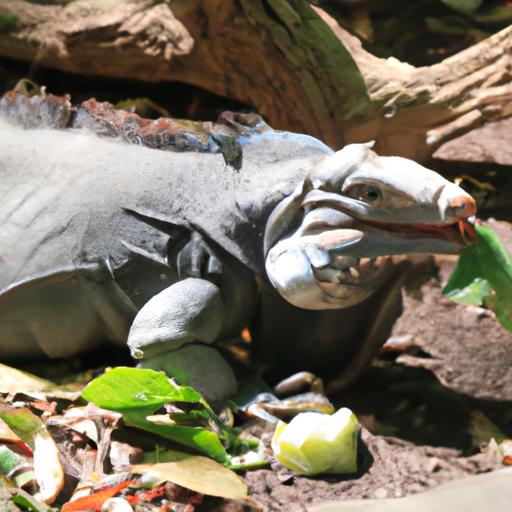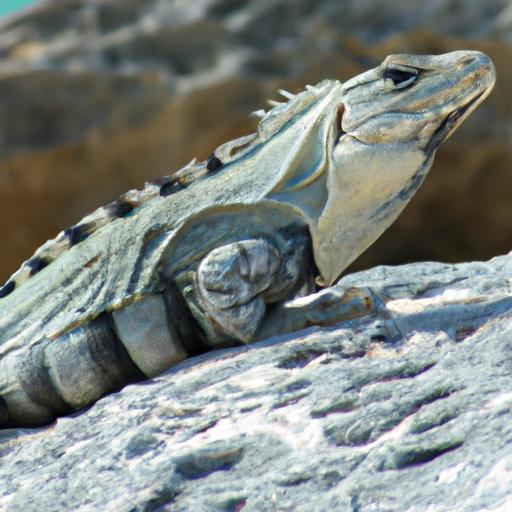
Discover everything you need to know about blue iguana nutrition facts. Learn about their dietary needs, feeding recommendations, and more in this comprehensive guide.
Blue iguanas are fascinating creatures native to the Grand Cayman Island. With their striking blue color and unique characteristics, they have become a popular choice for pet owners. However, to ensure their optimal health, it’s important to understand their nutritional needs. In this article, we will discuss the importance of nutrition for blue iguanas and provide you with all the information you need to care for your pet.
Blue Iguanas: An Overview
Blue iguanas are large reptiles known for their stunning blue coloration. As they mature, their blue hue becomes more prominent, often developing into a beautiful turquoise shade. These reptiles can grow up to 5 feet in length and weigh up to 30 pounds. With strong limbs and excellent swimming skills, they are well-adapted to their natural habitat.
One notable feature of blue iguanas is their spiny crest, which runs from their head to their tail. This crest serves as protection and a means of communication. They also have a dewlap, a flap of skin under their chin, used for regulating body temperature and communication with other iguanas.
Blue iguanas are native to the Grand Cayman Island, where they inhabit dry forests and rocky areas. Sadly, they are an endangered species, with only around 1,000 individuals remaining in the wild. To protect these incredible reptiles, the Blue Iguana Recovery Program has been established.
Nutritional Requirements of Blue Iguanas
Blue iguanas have specific nutritional needs to maintain their health and well-being. As a responsible pet owner, it’s crucial to understand the essential nutrients they require.
Essential Nutrients
Blue iguanas require the following essential nutrients:
- Protein: High levels of protein are necessary for muscle mass and tissue repair.
- Calcium: Calcium is crucial for bone health and egg production in females.
- Vitamin D3: Vitamin D3 aids in calcium absorption and promotes bone health.
- Fiber: Fiber is important for digestion and preventing issues like constipation.
Dietary Needs
Being herbivores, blue iguanas require a diet that includes vegetables, fruits, and plants. It’s vital to offer them a variety of foods to ensure they receive all the necessary nutrients. Some examples of calcium and vitamin D3-rich vegetables are collard greens, kale, and dandelion greens. Fruits like strawberries and papayas also provide essential vitamins and minerals.
Providing your blue iguana with a balanced diet offers numerous benefits. It helps prevent common health issues such as metabolic bone disease, which is caused by calcium and vitamin D3 deficiencies. A well-fed blue iguana will have a healthy immune system, be more active, and enjoy a longer lifespan.
Blue Iguana Nutrition Facts
To maintain their health, blue iguanas require a diet that is high in fiber and low in fat. Their natural diet primarily consists of leaves, flowers, and fruits, with the occasional inclusion of insects or small animals. It is important to refrain from feeding them any form of animal protein.
Nutrient Content of Blue Iguana Diet
The ideal diet for blue iguanas should consist of a variety of vegetables and fruits to provide them with the necessary nutrients. Key nutrients they require include calcium for bone growth and development, vitamin D3 for calcium absorption and bone health, and fiber for good digestion.
Comparison to Other Reptile Diets
Compared to other reptiles, blue iguanas have unique dietary requirements. Unlike many other reptiles, they cannot digest animal protein, making a strictly herbivorous diet essential. Additionally, blue iguanas have a higher need for calcium than some reptiles.
Importance of Calcium and Vitamin D3
Calcium and vitamin D3 are crucial for blue iguanas. Inadequate levels of calcium can lead to metabolic bone disease, resulting in deformities and even death. Vitamin D3 is vital for calcium absorption and bone growth. Insufficient vitamin D3 can cause weak bones and fractures.
In summary, blue iguanas require a diet high in fiber, low in fat, and strictly herbivorous. They need sufficient calcium and vitamin D3 to maintain their health and prevent metabolic bone disease. By providing them with a diverse diet that meets their nutritional needs, you can ensure your blue iguana remains healthy and happy.
Feeding Blue Iguanas
Feeding your blue iguana is crucial for their optimal health. Let’s discuss how often to feed them, recommended food sources, and the importance of variety in their diet.
How Often to Feed
Blue iguanas should be fed daily, with the amount of food based on their size. As a general rule, the portion should be equivalent to the size of their head. Avoid overfeeding, as it can lead to obesity and other health issues.
Recommended Food Sources
Blue iguanas require a diet high in fiber and low in fat. They primarily consume leafy greens such as collard greens, mustard greens, and dandelion greens. Apples, bananas, and strawberries are suitable fruit choices. Avoid animal protein and iceberg lettuce, as they can cause health problems.
Importance of Variety in Diet
To ensure your blue iguana receives all the necessary nutrients, it’s important to provide a variety of greens and fruits in their diet. This will keep their meals interesting and ensure a well-balanced diet.
In conclusion, a balanced diet is essential for the overall health and well-being of blue iguanas. By following the guidelines provided in this article, you can ensure your pet receives the nutrition it needs to thrive. Remember to offer fresh water daily and monitor their calcium and vitamin D3 intake.
At iguanafacts.com, we are committed to providing comprehensive information about blue iguanas and their care. We hope this article has been informative and helpful. For any further questions or concerns, don’t hesitate to reach out to us.
Thank you for choosing iguanafacts.com as your go-to resource for all things blue iguanas!




